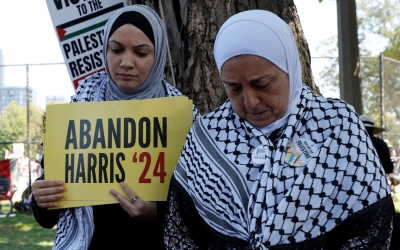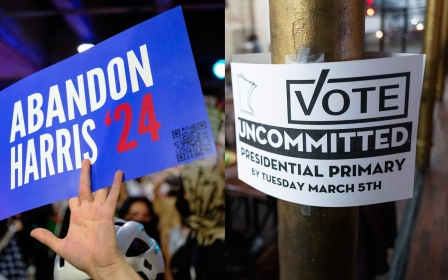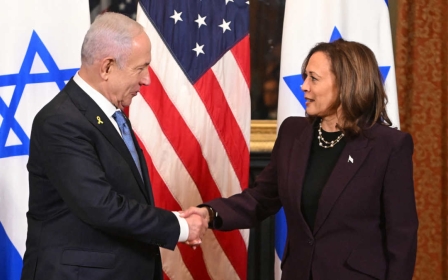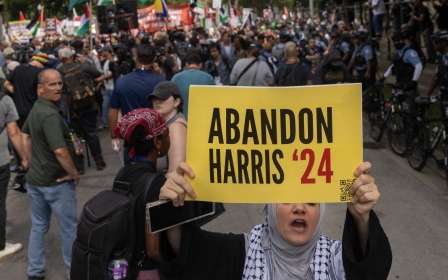US: Anti-war organisers mobilise against Kamala Harris ahead of presidential debate in Pennsylvania
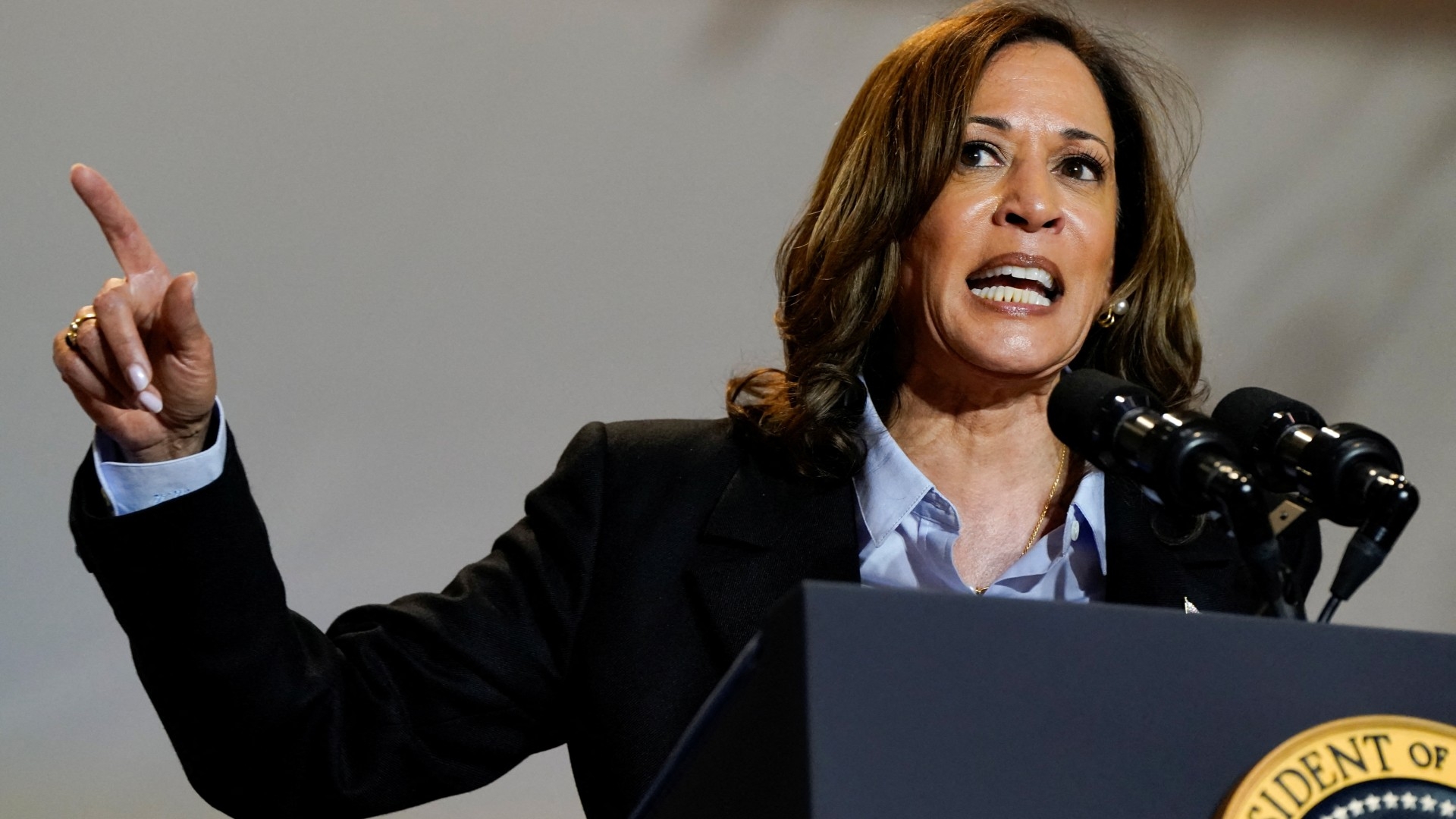
Kamala Harris and Donald Trump will face off on Tuesday night in the swing state of Pennsylvania to kick off the first debate between the two since Harris became the Democratic presidential nominee.
But pro-Palestine activists throughout the country have signalled their intention to boycott Vice President Kamala Harris in the upcoming presidential election over US support for Israel's war in Gaza - and voters in the battleground state of Pennsylvania are no exception.
One expression of this is the No Ceasefire No Vote PA (NCNV) campaign. The initiative, launched on 25 July by a group of activists mainly based in Philadelphia, aims to collect pledges from people throughout Pennsylvania who will not vote for Harris so long as she and the Biden administration continue backing Israel’s war on Gaza.
For Reem Abuelhaj, a Palestinian American and organiser of NCNV, this marks a significant rupture within the Democratic Party.
“I’m a Super Voter who is pretty engaged and involved in local, state, and national elections,” Abuelhaj said. “For me, this is the first time I’m finding myself in a position of being unable to cast my ballot for the Democratic candidate, unless she takes action to end this genocide.”
New MEE newsletter: Jerusalem Dispatch
Sign up to get the latest insights and analysis on Israel-Palestine, alongside Turkey Unpacked and other MEE newsletters
Super Voters are members of the public who help mobilise, inform and help build voting strategies in their communities
Middle East Eye spoke with several organisers involved in the NCNV campaign. Some saw Harris as more responsive to pressure than President Biden or felt that Donald Trump represents a greater danger to communities within the United States.
Others were more sceptical of the Democrats and electoral politics in general. All agreed that they could not imagine voting for Harris so long as she continued to aid Israel’s war on Gaza.
NCNV organisers believe that their campaign can be a point of leverage to convince Biden and Harris to change their policy of support for Israel, given the weight that Pennsylvania holds in the election.
A recent CNN/SSRS poll found Harris and Trump tied at 47 percent of the vote in Pennsylvania. However, the same poll found that only one percent of Pennsylvania voters listed foreign policy as the most important issue informing how they’ll vote.
But foreign policy is likely to guide Muslim voters a lot more heavily than the general public. A Council on Islamic-American Relations (Cair) poll released on Monday showed Kamala Harris leading among Muslim voters in Pennsylvania by 37 percent, beating out Green Party candidate Dr Jill Stein’s 25 percent. She also leads the swing states of Georgia and Nevada.
Democrats won the state back from Trump in 2020 by just 1.17 percent.
Many Muslim voters could be looking to the debate in Pennsylvania to see what Harris will say about Israel's war on Gaza and whether she will stray from her administration's current stance.
Foreign policy hits close to home
Many of the activists who spoke to MEE, however, do not see Gaza as just a foreign policy issue. Some, like Jewish activist Hannah Zellman, explained how military spending affects communities within the United States.
“I can tell you so many things that I would like my tax dollar to go towards that are not the war economy,” Zellman said. “Healthcare, education, climate change. There’s a lot of issues that are impacting voters that we could be better spending our money on.”
Others, like Aniqa Raihan, the daughter of immigrants from Bangladesh, added that it makes sense for certain communities to place added importance on foreign policy.
“I see people who look like me being extra-judicially murdered or their entire society is being toppled for oil,” Raihan said. “When it’s said to me I shouldn’t care about those things, that’s always rubbed me the wrong way.”
Many of the sentiments expressed by people in Philadelphia are shared by organisers throughout the state.
Hadeel Salameh is a Palestinian-American currently living in Mechanicsburg in Central Pennsylvania and organising with the Harrisburg Palestine Coalition (HPC), a group formed in response to Israel’s war on Gaza.
Salameh expressed frustration with some allies who intend to vote for Harris because they view her as the “lesser evil.”
“To me… that’s privilege speaking because it can’t get worse for Palestinians,” Salameh said. “To me, that’s not allyship. That’s not liberation for all. That’s putting our own self-interest against a genocide that’s being perpetrated.”
Brian Keisling, a Jewish activist and member of HPC, said that despite disagreements among different groups over how to vote, it has not gotten in the way of the coalition advancing grassroots work. He sees the Palestinian struggle as part of a larger fight against injustice.
“I think it is important to remember regardless of party and regardless of rhetoric, if politicians in power in the United States are willing to commit genocide against one group of people, then there is no group of people that they will not throw under the bus when the moment comes,” Keisling said.
Enter third party
HPC has not made an official decision about how to engage with the election, but Salameh shared that most people she organises with are likely to vote for the third-party candidate, Jill Stein.
The Cair poll shows Harris trailing Stein in the three key swing states of Michigan, Wisconsin and Arizona.
'I can tell you so many things that I would like my tax dollar to go towards that are not the war economy'
- Pennsylvanian activist
Shalah R, a member of coalitions organising in Lehigh Valley and in Northeast Pennsylvania, said that she sees third-party candidate popularity rising. Shalah, who asked that her full name not be included, said she supports Cornel West but expressed enthusiasm for Leila Hazou, a Green Party senate candidate in Pennsylvania.
While most of the people who spoke to MEE expressed certainty over how they and their communities are planning to vote, some indicated that they and people they talk to are more conflicted over how to vote. Two students in Lehigh Valley were considering voting for Harris but felt contempt for the two-party system and lesser-evil arguments.
“People are trying to use scare tactics into getting me to vote, which I find so ridiculous and so annoying,” Sarah Stevens, a student activist at Lehigh University, said.
Raihan spoke about some of the conversations at the university in Philadelphia where she studies.
“People are talking about it a lot,” Raihan said. “I would say that the majority of young people I know are, like me, not sure what they’re going to do.”
Raihan has not decided how she will vote, noting that she knows people who were deported by Trump, and was raised to see Democrats as better for immigrants. But she added that if the election were to take place now, she couldn’t imagine voting for Harris.
Pennsylvania is a key battle state and eventual presidents won the state in 10 out of the last 12 elections. The state also has the most electoral votes out of all the swing states, and Muslim voters played a strong role in helping Biden win the state in 2020.
Pennsylvanians have indicated in their conversations with MEE, that this time around, the Muslim and Arab American vote will be more fractured than it was in 2020.
Middle East Eye delivers independent and unrivalled coverage and analysis of the Middle East, North Africa and beyond. To learn more about republishing this content and the associated fees, please fill out this form. More about MEE can be found here.


